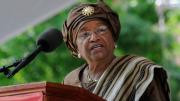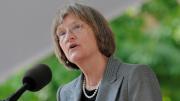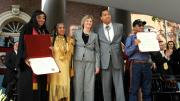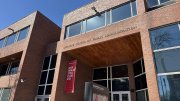In offering advice to the 2011 graduates, principal Commencement speaker Ellen Johnson Sirleaf, M.P.A. ’71, LL.D. ’11, Liberia’s president since 2006, looked to her own experience—and that experience is notable: in four decades of involvement in Liberian politics, she has endured exile, imprisonment (twice), and the threat of execution.
The simple fact that there had never before been a female elected head of state, either in her own country or in all of Africa, didn’t deter her from running not once but twice (she placed a distant second in 1997). “Just because something has not been done as yet," Sirleaf said, "doesn’t mean it cannot be done.”
Her speech at times echoed the 2008 address in which Harry Potter author J.K. Rowling spoke of her own moments of despair as an impoverished single mother in the days before she was a published author. “You cannot appreciate success if you do not know failure,” Sirleaf said. “There were times when I thought death was near, and times when the burden of standing tall by one’s conviction seemed only to result in failure. But through it all, my experience sends a strong message that failure is just as important as success.”
She challenged the University’s newest alumni to aim high: “The size of your dreams must always exceed your current capacity to achieve them. If your dreams do not scare you, they are not big enough.”
Sirleaf will run for reelection in November, and she used the Harvard dais to enumerate her administration’s accomplishments: increasing government revenue by more than 400 percent; multiplying foreign direct investment sixteenfold; building an army and a coast guard; taking the economy from negative growth to 6 percent annually; restoring the electricity and public water supply Liberia’s capital had lacked for two decades.
In one way, she chided her listeners, her nation is ahead of the United States: Barack Obama’s victory was a landmark, but Liberia was first to elect a woman president.
Noting that “the person who claims to be the strongest opposition contender” in the coming election—presumably Winston Tubman, LL.M. ’66, though she did not name him—“is a Harvard graduate,” she assured her listeners that “the incumbent, who is also a Harvard graduate, is determined to win in a truly free and fair process.” Whatever the result, then, “The relationship between Harvard and Liberia is thus secured and in good hands.”
Although dangers remain—Sirleaf noted that two of Liberia’s three neighbors “have either experienced or narrowly avoided civil war in the past year”—her message was one of hope for the country and the whole continent.
For the children of Liberia, gunfire is no longer a familiar sound: “They can smile again,” she said to robust applause. “Africa is no longer a continent of countries with corrupt big men who rule with iron fists. It is no longer the Dark Continent in continual economic freefall, wallowing in debt, poverty, and disease.”
In 1989, she noted, there were three democracies in sub-Saharan Africa; by 2008, there were 23. She listed countries experiencing rapid growth in their middle classes: Ghana, Mozambique, Mali, Tanzania, Cape Verde, Botswana, Burkina Faso, and Rwanda. She said she hoped Liberia could join these ranks, predicting that it could merit classification as a middle-income country by 2030.
Sirleaf also observed how much the world had changed since September 11, 2001. News of that day’s events reached most people through traditional media, not social networking sites and smartphones, but in the 10 years since, “the world has become smaller and more connected.” As traditional hierarchies of power are upended, Sirleaf said, “History, it seems, is speeding up.”
Globalization was also a theme in President Drew Faust’s address. Both speakers noted the changes that swept the Middle East this year in the Arab Spring.
Harvard’s student body is increasingly international—20 percent, Faust said. She noted the “intensity” of undergraduates’ interest in foreign languages: “They understand the kind of world they will live in, and they want to be prepared.” She mentioned numerous University international initiatives, and pointed out that she has visited five continents during her presidency.
To be competitive in this globalized world, Faust reminded her audience, the United States must prioritize higher education. Amid disturbing signs—Pennsylvania’s governor proposes halving the state’s higher-education appropriations; University of California leaders last week warned of a possible tuition increase of 32 percent; aid for needy students and funding for scientific research are under threat in Congress—she reiterated Harvard’s commitment to socioeconomic diversity among its students, emphasizing that more than 60 percent of undergraduates and 70 percent of medical students now receive financial aid, and nearly 20 percent of this year’s freshman class came from families with incomes below $60,000.
“Education has never mattered more to individual lives,” she said. “In the midst of the Great Recession, the unemployment rate for college graduates in the United States was less than half that for those with just a high-school diploma. Those with bachelor's degrees earn half again as much as high-school graduates. Doctoral or professional degrees nearly double earnings again.”
As the liberal-arts model begins to spread internationally—this year, China’s Tsinghua University debuted a required course modeled on Bass professor of government Michael Sandel’s popular undergraduate course, “Justice”—American universities must not abandon it, she said.
Lastly, she said, the United States must prize innovation if it is to remain a global leader. She lauded several projects of individual Harvard students and professors, and said she is proud of the University’s own innovations. She mentioned the Harvard libraries' response to the digital revolution, and said: “We have innovated—after 350 years!—with governance, expanding and enhancing the Corporation."
As part of the ceremony, which is officially the annual meeting of the Harvard Alumni Association (HAA), the results of elections for Overseers and HAA directors were announced.
Faust also awarded a special posthumous degree to Joel Iacoomes, a member of the Wampanoag tribe who would have received his degree in 1665 had he not died in a shipwreck while visiting his family on Martha’s Vineyard just before graduation. Accepting the degree on Iacoomes’s behalf were Tiffany Smalley ’11, also of Wampanoag descent, and Bernard Coombs of the Mashpee Tribe, a descendant of Iacoomes.











